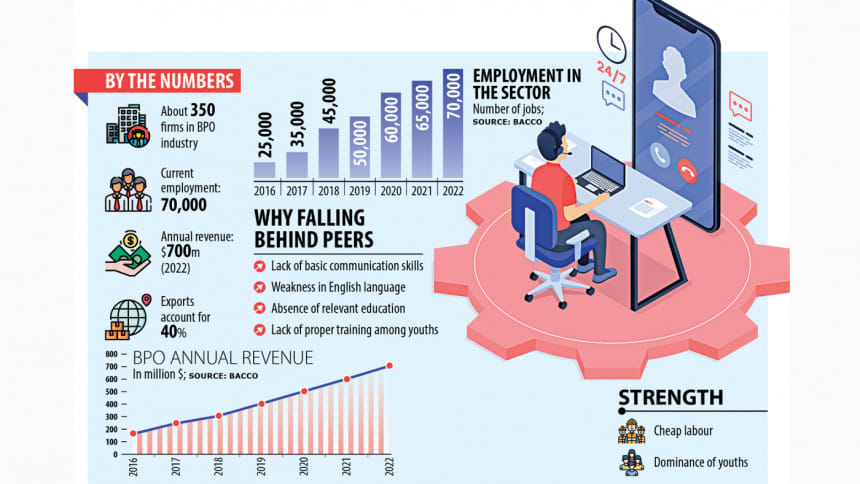Business process outsourcing industry growing steadily

Bangladesh's business process outsourcing industry is growing steadily, creating jobs and bringing in foreign currencies, but the growth has failed to live up to expectations due to a lack of human resources and language skills among graduates.
As wages are relatively low in Bangladesh, the industry has the potential to grow exponentially and generate billions of dollars in export earnings, said people engaged in the industry.
Finding a graduate having the basic communication skills -- being able to speak clearly, understanding the needs of customers and writing properly -- is tough.
The sector's annual revenue increased by 17 per cent in 2022, taking the total to $700 million, according to an estimate of the Bangladesh Association of Contact Center and Outsourcing.
Of the figure, the export market accounts for $300 million and the rest comes from the local market.
Over 350 local companies, most of them small and medium-sized, are providing a host of services such as of call centres, chat support, digital marketing, image processing, marketing, payroll and human resource, and account and supply chain management.
But the revenue of the industry is very low when compared to its worldwide size.
The revenue of the global BPO industry stood at $330 billion in 2022 and is projected to reach $350 billion this year, according to global data firm Statista.
The BPO industry in countries such as India and the Philippines are earning a huge amount of foreign currencies thanks to their superior skills in the English language.
On the other hand, firms in Bangladesh find it difficult to get a fresh graduate who can speak Bangla properly, let alone other languages, industry people allege.
"Finding a graduate having the basic communication skills – being able to speak clearly, understanding the needs of customers and writing properly -- is a tough job," said Wahid Sharif, president of the association.
"The basics of most fresh graduates are missing. They can't write an application properly and numerous mistakes are found in their punctuation, both in English and Bangla. Many of them can't even speak in Bangla with proper pronunciation, let alone English."
He thinks the country needs to overhaul the education system and includes the industry in the process of formulating the education policy.
"Now there is a big opportunity for Bangladesh as the Philippines market is turning costlier for global clients," said Sharif, also the managing director of Digicon Technologies.
"But if there is a need for 100 people, we can't even find three. If we want to maintain a big team, the cost of goods delivery turns expensive. It reduces our competitiveness."
Other major challenges faced by the industry are "never-ending" customer expectations, repeated technical disruptions and issues of health and safety, according to Md Mamunur Rahman, CEO of Net Bangla, which employs more than 50 people.
"The employee attrition in the BPO industry is pretty high. Companies are not able to effectively retain their employees for a long time. So, they suffer huge losses every time they have to train up new employees."
Despite the challenges, voice services in Bangladesh are on the rise thanks to the government's effort to ensure the smooth delivery of citizen services and outsource services from call centres.
Synesis IT Ltd, which currently employs 550 people, is providing call centre solutions, enabling its clients to reach target groups, track contacts and gather relevant data for customer relationship management.
It also designed, developed and implemented many projects such as a Probash Bondhu Call Center for the government's a2i project, a Union Parishad HelpLine and a helpline for the Dhaka Water Supply and Sewerage Authority.
"We have been providing various types of services of the government to the citizens, solving many problems. Now we are trying to export these services to other countries," said its managing director and co-founder, Shohorab Ahmed Chowdhury.
Another segment that shows great promise in the BPO industry is the outsourcing of graphic designing and image editing.
India, the Philippines and Vietnam have long been among the major markets for outsourcing for global clients but Bangladesh has also become a favourite destination owing to its offers of lower prices and the ability to deliver projects on a large scale.
Currently, 7,000 people are working at more than 100 small and medium companies in the country specialising in graphic designing and image editing.
Another 50,000 are working as freelancers, according to an estimate by industry people.
According to the association, there are more than 70,000 people working in the BPO industry.
Kowser Ahmed Nirob, CEO and founder of The KOW Company, said 3D images, a computer-generated graphic or image that provides the perception of depth like a real-world object, would rule the roost in the BPO industry.
"We are working on it with some of the top global retailers," he said. The KOW Company currently employs over 550 people.

 For all latest news, follow The Daily Star's Google News channel.
For all latest news, follow The Daily Star's Google News channel. 




Comments